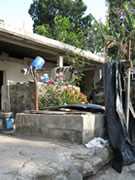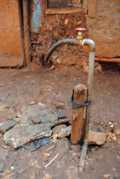WASH Away Neglected Tropical Diseases (NTDs) Projects

Well in Guatemala
CDC's WASH Away NTDs Activity began its work in Guatemala in partnership with the Universidad del Valle de Guatemala and the Ministerio de Salud Pública y Asistencia Social. A cross-agency team at CDC, comprised of staff from the Waterborne Disease Prevention Branch, the Environmental Global WASH Activity, the Parasitic Diseases Branch, and the International Emerging Infections Program worked with partners in Guatemala to pilot test a toolkit of questionnaires and protocols during the summer of 2010. This toolkit was used to compare levels of disease in the community with water, sanitation, and hygiene (WASH) status using a variety of epidemiologic, laboratory, and environmental assessment methods.
The diseases of interest in this study were intestinal worms (also known as soil-transmitted helminths [STH]), diarrhea, and respiratory illness. These data will be used to develop a WASH rapid assessment tool predictive of disease risk that could be used for WASH advocacy and infrastructure sustainability monitoring.

Public tap in Kenya.
Components of this toolkit are now being used in Kenya to assess WASH impact on STH, diarrhea, and respiratory illness in an urban informal settlement. The Kenya WASH evaluation is a collaboration between CDC’s Waterborne Disease Prevention Branch, Parasitic Diseases Branch, and International Emerging Infections Program with the Kenyan Medical Research Institute (KEMRI). The data collected in Kenya will be compared to similar data from Guatemala to further refine the WASH rapid assessment tool. The toolkit will also form the basic platform on which to add future modules to assess other WASH-related neglected tropical diseases (for example, schistosomiasis, trachoma).
- Page last reviewed: August 24, 2012
- Page last updated: August 24, 2012
- Content source:


 ShareCompartir
ShareCompartir